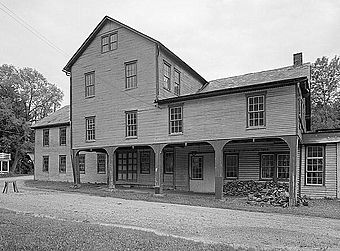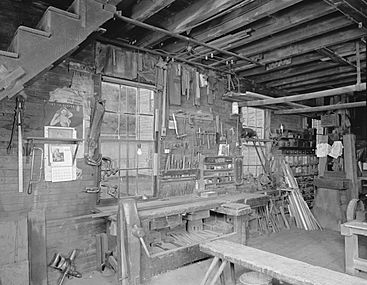Gruber Wagon Works facts for kids
The Gruber Wagon Works is a special historic building in Bern Township, Pennsylvania, United States. It was built around 1882. This place is super rare because it's a complete 19th-century factory for making wagons! It still has all its old tools and machines.
The wagon works was first built in a place called Pleasant Valley. But in 1976, it had to move. It was moved about 5 miles (8 km) to its current spot in Tulpehocken Creek Park. This move happened because of a big flood control project. In 1977, it was named a National Historic Landmark. Today, it's part of a cool outdoor museum where you can visit and learn about history.
Contents
Explore the Wagon Works
The Gruber Wagon Works is located northwest of Reading, Pennsylvania. It sits near Tulpehocken Creek. The main building is made of wood and has 2-1/2 stories. It has a unique cross shape with sloped roofs. The bottom part is made of stone.
Inside the Factory
Inside the building, you'll find different areas for making wagons. There's a wood shop, where wood was shaped. There's also a blacksmithy, where metal parts were made. Other areas include a bench shop and a paint shop.
You can still see lots of old tools and machines inside. These include special tools for making wagon wheels and axles. There are also many saws, sanders, and other woodworking machines. Most of these machines were powered by belts connected to a gasoline engine. To move materials between floors, the Gruber family added a hand-operated elevator in 1905-1906.
Outside the Main Building
Outside the main factory, there are two smaller buildings. One was an outhouse, which is an old-fashioned toilet. The other was used to store iron for the blacksmith.
A Family Business Story
Franklin H. Gruber started making wagons for farms in the 1870s. He built the Gruber Wagon Works in 1882. His family continued to run the business for many years. They made both standard and custom wagons.
The business kept going until the 1950s. After that, they mostly did wagon repairs. The factory finally closed its doors in 1971. When it closed, all the equipment and machines were still inside. A curator from the Smithsonian National Museum of History and Technology said it was like a "three-dimensional document" of an American industry. It was a rare look into a specific time in history.
Moving a Historic Building
The original location of the Gruber Wagon Works was in Pleasant Valley. This area was going to be flooded to create Blue Marsh Lake. So, the Army Corps of Engineers bought the building.
During the winter of 1976–1977, they carefully moved the entire building. It traveled about 5 miles (8 km) east to its new home. This was a huge project!
The Berks County Heritage Center
Today, the Gruber Wagon Works is part of the Berks County Heritage Center. This is an outdoor museum complex. Besides the wagon works, you can also find other cool things there.
These include the C. Howard Hiester Canal Center, which teaches about canal transportation. There's also Wertz's Covered Bridge, Melcher's Grist Mill, and Deppen Cemetery. You can also see several memorials and gardens. The Heritage Center is open during certain seasons. You can take tours of the historic buildings and learn all about them.
Images for kids





